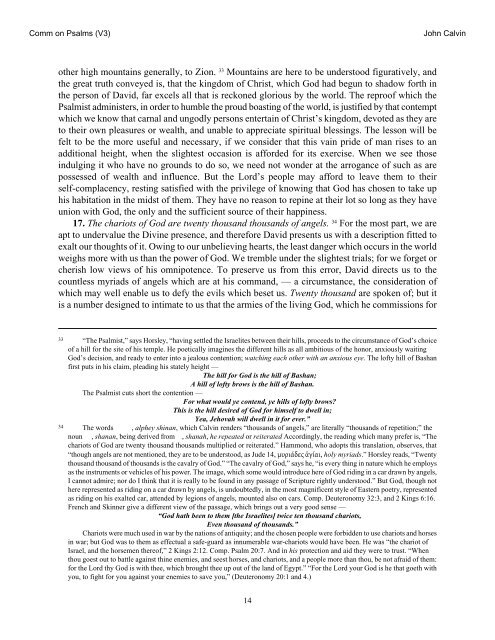Commentary on Psalms - Volume 3 - Bible Study Guides
Commentary on Psalms - Volume 3 - Bible Study Guides
Commentary on Psalms - Volume 3 - Bible Study Guides
- No tags were found...
You also want an ePaper? Increase the reach of your titles
YUMPU automatically turns print PDFs into web optimized ePapers that Google loves.
Comm <strong>on</strong> <strong>Psalms</strong> (V3)John Calvinother high mountains generally, to Zi<strong>on</strong>. 33 Mountains are here to be understood figuratively, andthe great truth c<strong>on</strong>veyed is, that the kingdom of Christ, which God had begun to shadow forth inthe pers<strong>on</strong> of David, far excels all that is reck<strong>on</strong>ed glorious by the world. The reproof which thePsalmist administers, in order to humble the proud boasting of the world, is justified by that c<strong>on</strong>temptwhich we know that carnal and ungodly pers<strong>on</strong>s entertain of Christ’s kingdom, devoted as they areto their own pleasures or wealth, and unable to appreciate spiritual blessings. The less<strong>on</strong> will befelt to be the more useful and necessary, if we c<strong>on</strong>sider that this vain pride of man rises to anadditi<strong>on</strong>al height, when the slightest occasi<strong>on</strong> is afforded for its exercise. When we see thoseindulging it who have no grounds to do so, we need not w<strong>on</strong>der at the arrogance of such as arepossessed of wealth and influence. But the Lord’s people may afford to leave them to theirself-complacency, resting satisfied with the privilege of knowing that God has chosen to take uphis habitati<strong>on</strong> in the midst of them. They have no reas<strong>on</strong> to repine at their lot so l<strong>on</strong>g as they haveuni<strong>on</strong> with God, the <strong>on</strong>ly and the sufficient source of their happiness.17. The chariots of God are twenty thousand thousands of angels. 34 For the most part, we areapt to undervalue the Divine presence, and therefore David presents us with a descripti<strong>on</strong> fitted toexalt our thoughts of it. Owing to our unbelieving hearts, the least danger which occurs in the worldweighs more with us than the power of God. We tremble under the slightest trials; for we forget orcherish low views of his omnipotence. To preserve us from this error, David directs us to thecountless myriads of angels which are at his command, — a circumstance, the c<strong>on</strong>siderati<strong>on</strong> ofwhich may well enable us to defy the evils which beset us. Twenty thousand are spoken of; but itis a number designed to intimate to us that the armies of the living God, which he commissi<strong>on</strong>s for33 “The Psalmist,” says Horsley, “having settled the Israelites between their hills, proceeds to the circumstance of God’s choiceof a hill for the site of his temple. He poetically imagines the different hills as all ambitious of the h<strong>on</strong>or, anxiously waitingGod’s decisi<strong>on</strong>, and ready to enter into a jealous c<strong>on</strong>tenti<strong>on</strong>; watching each other with an anxious eye. The lofty hill of Bashanfirst puts in his claim, pleading his stately height —The hill for God is the hill of Bashan;A hill of lofty brows is the hill of Bashan.The Psalmist cuts short the c<strong>on</strong>tenti<strong>on</strong> —For what would ye c<strong>on</strong>tend, ye hills of lofty brows?This is the hill desired of God for himself to dwell in;Yea, Jehovah will dwell in it for ever.”34 The words , alphey shinan, which Calvin renders “thousands of angels,” are literally “thousands of repetiti<strong>on</strong>;” thenoun , shanan, being derived from , shanah, he repeated or reiterated Accordingly, the reading which many prefer is, “Thechariots of God are twenty thousand thousands multiplied or reiterated.” Hamm<strong>on</strong>d, who adopts this translati<strong>on</strong>, observes, that“though angels are not menti<strong>on</strong>ed, they are to be understood, as Jude 14, μυριάδες ἁγίαι, holy myriads.” Horsley reads, “Twentythousand thousand of thousands is the cavalry of God.” “The cavalry of God,” says he, “is every thing in nature which he employsas the instruments or vehicles of his power. The image, which some would introduce here of God riding in a car drawn by angels,I cannot admire; nor do I think that it is really to be found in any passage of Scripture rightly understood.” But God, though nothere represented as riding <strong>on</strong> a car drawn by angels, is undoubtedly, in the most magnificent style of Eastern poetry, representedas riding <strong>on</strong> his exalted car, attended by legi<strong>on</strong>s of angels, mounted also <strong>on</strong> cars. Comp. Deuter<strong>on</strong>omy 32:3, and 2 Kings 6:16.French and Skinner give a different view of the passage, which brings out a very good sense —“God hath been to them [the Israelites] twice ten thousand chariots,Even thousand of thousands.”Chariots were much used in war by the nati<strong>on</strong>s of antiquity; and the chosen people were forbidden to use chariots and horsesin war; but God was to them as effectual a safe-guard as innumerable war-chariots would have been. He was “the chariot ofIsrael, and the horsemen thereof,” 2 Kings 2:12. Comp. Psalm 20:7. And in his protecti<strong>on</strong> and aid they were to trust. “Whenthou goest out to battle against thine enemies, and seest horses, and chariots, and a people more than thou, be not afraid of them:for the Lord thy God is with thee, which brought thee up out of the land of Egypt.” “For the Lord your God is he that goeth withyou, to fight for you against your enemies to save you,” (Deuter<strong>on</strong>omy 20:1 and 4.)14
















